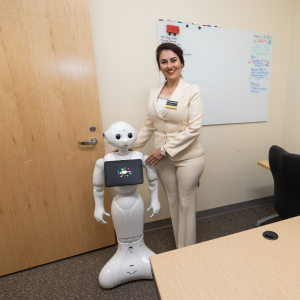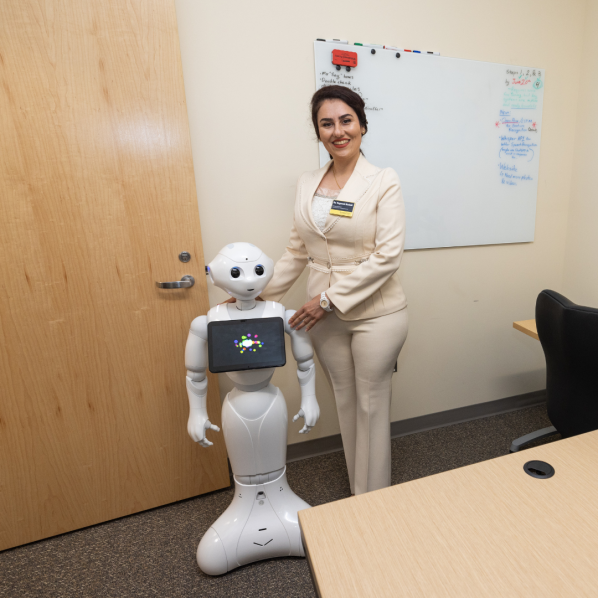BOONE, N.C. — On Wednesday, June 25, the Appalachian State University Department of Computer Science celebrated the opening of its Robotics Lab in Anne Belk Hall. The event featured demonstrations by Dr. Yeganeh Madadi, assistant professor and director of the Robotics Lab in the Department of Computer Science, and students enrolled in her first Introduction to Robotics course.
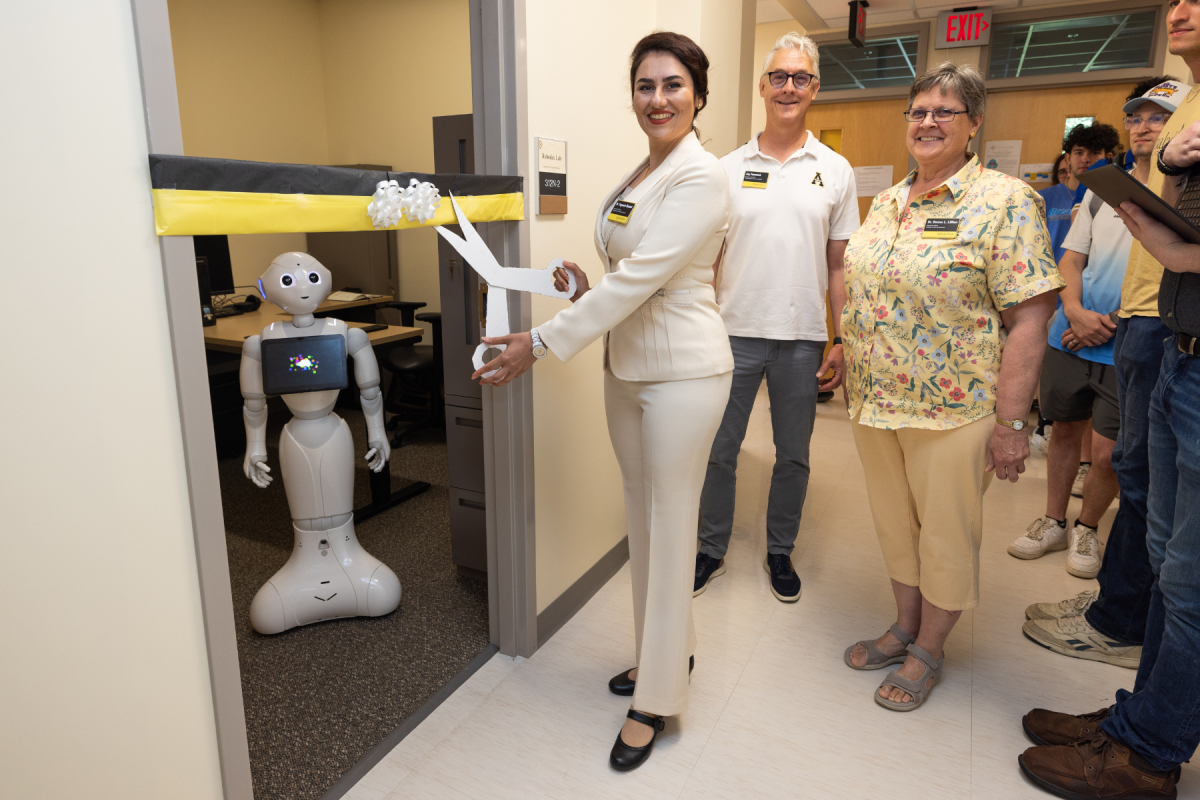
Dr. Yeganeh Madadi (left), assistant professor and director of the Robotics Lab in the Department of Computer Science, cuts the ribbon with Dr. Jay Fenwick, chair of the Department of Computer Science (middle), and Dr. Donna Lillian, associate dean in the College of Arts and Sciences (right), during the Robotics Lab opening on June 25 in Anne Belk Hall. Photo by Chase Reynolds
Dr. Madadi, who earned her Ph.D. in Computer Engineering, Artificial Intelligence, and Robotics from the Azad University of Tehran, worked as a research scholar in the Data Mining and Machine Learning Lab at the University of Tennessee Health Science Center before joining the App State Department of Computer Science in 2024. Madadi's research interests include artificial intelligence, machine learning, data mining, deep learning, image processing, computer vision, data analysis, bioinformatics, and, of course, robotics.
The June 25 celebration kicked off with a demonstration featuring YeRo, a humanoid robot. Madadi—in collaboration with Department of Rehabilitation Sciences professor Dr. Monica Bellon-Harn, Computer Science graduate students Zach Carter ’24 and Michael Sciole ’24, and Computer Science undergraduate students Nathan Pereira and Molly Watson—is training YeRo to assist children with their communication skills.
Madadi explained that trained humanoid robots equipped with speech generation and gesture recognition can facilitate two-way interactions that support both verbal and non-verbal children. YeRo is programmed to connect to Large Language Models, enhancing its ability to communicate and interact dynamically with users. After greeting the audience, YeRo led them through two activities that exercised their verbal and motor skills by asking them to replicate the robot's words and movements.
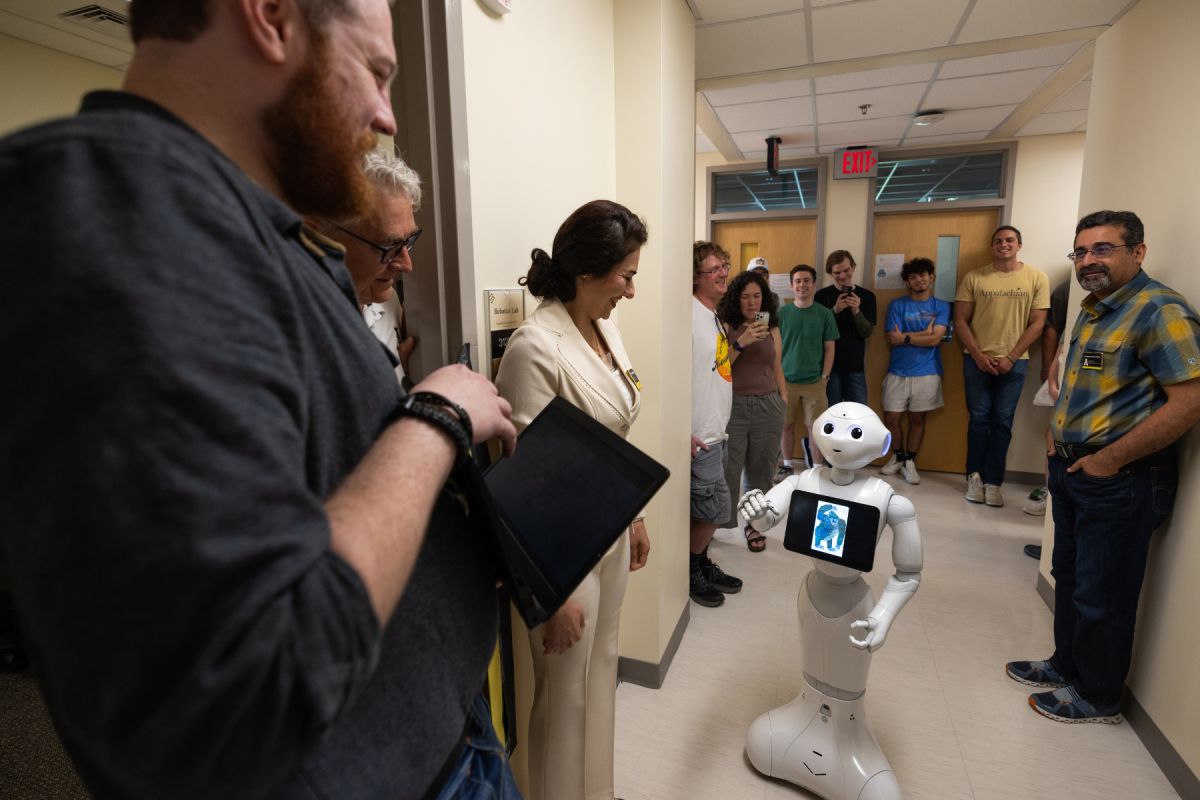
Zach Carter ’24 (left), a graduate student in the Computer Science program, and Dr. Yeganeh Madadi, assistant professor in the Department of Computer Science and director of the Robotics Lab, demonstrate how YeRo, a humanoid robot, can assist children with their communication skills. Photo by Chase Reynolds
Next, students in Madadi's Introduction to Robotics course—offered for the first time during Summer Session I—showcased their final projects. For the course, the students programmed robotic vehicles to battle each other, remain inside perimeters, track lines, and avoid obstacles.
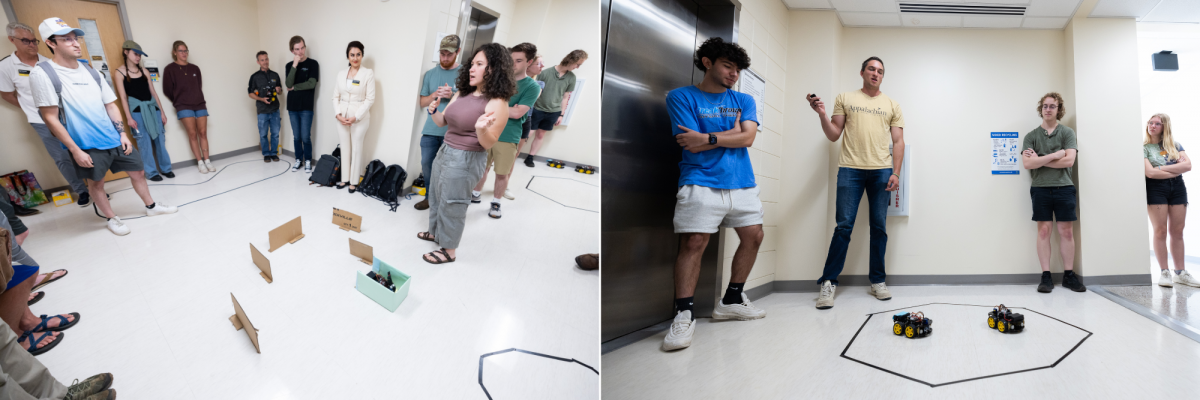
Left: Molly Watson, a senior computer science major and student in the Introduction to Robotics course, demonstrates her robotic vehicle's ability to avoid obstacles with a decision-making algorithm. Right: Alexander Jones, a junior computer science major and student in the Introduction to Robotics course, demonstrates his robotic vehicle's ability to remain inside perimeters. Photos by Chase Reynolds
The establishment of the Robotics Lab and the development of the Introduction to Robotics course were supported in part by two College of Arts and Sciences (CAS) opportunities: The Billy and Del Hunt Helton Faculty Excellence Fund and a CAS Research/Proposal Development Summer Grant.
"The vision and mission of the Robotics Lab are to create an environment that fosters innovative research, hands-on learning, and interdisciplinary collaboration, empowering students and researchers to develop intelligent robotic systems that improve lives and address real-world challenges. We are committed to advancing both the theoretical and practical aspects of robotics, integrating artificial intelligence, machine learning, and human-robot interaction to push the boundaries of what robots can achieve in society," shared Madadi. "I would like to extend my heartfelt gratitude to CAS, the Computer Science department, and the Helton family for their generous support, which has been instrumental in making this vision a reality."
In addition to pursuing more funding, Madadi hopes to expand the robotics curriculum, increase interdisciplinary research, and disseminate her findings through journal publications and conference presentations in the future. She invites the campus community and industry partners to contact her if they have project ideas or grant proposals, or if they want to tour the new Robotics Lab.
To learn more about Madadi and her research, visit her website at sites.google.com/appstate.edu/dr-yeganeh-madadi.
###
About the Department of Computer Science
Appalachian’s Department of Computer Science provides a rigorous, high-quality education that prepares students for the computing industry or graduate education. It offers a Bachelor of Science degree in computer science, which is accredited by the Computing Accreditation Commission of ABET, and a Master of Science degree in computer science. Learn more at compsci.appstate.edu.
About the College of Arts and Sciences
The College of Arts and Sciences (CAS) at Appalachian State University is home to 17 academic departments, two centers and one residential college. These units span the humanities and the social, mathematical and natural sciences. CAS aims to develop a distinctive identity built upon our university's strengths, traditions and locations. The college’s values lie not only in service to the university and local community, but through inspiring, training, educating and sustaining the development of its students as global citizens. More than 6,800 student majors are enrolled in the college. As the college is also largely responsible for implementing App State’s general education curriculum, it is heavily involved in the education of all students at the university, including those pursuing majors in other colleges. Learn more at cas.appstate.edu.
Written by Lauren Gibbs
Edited by Dr. Yeganeh Madadi
July 10, 2025
BOONE, N.C.
